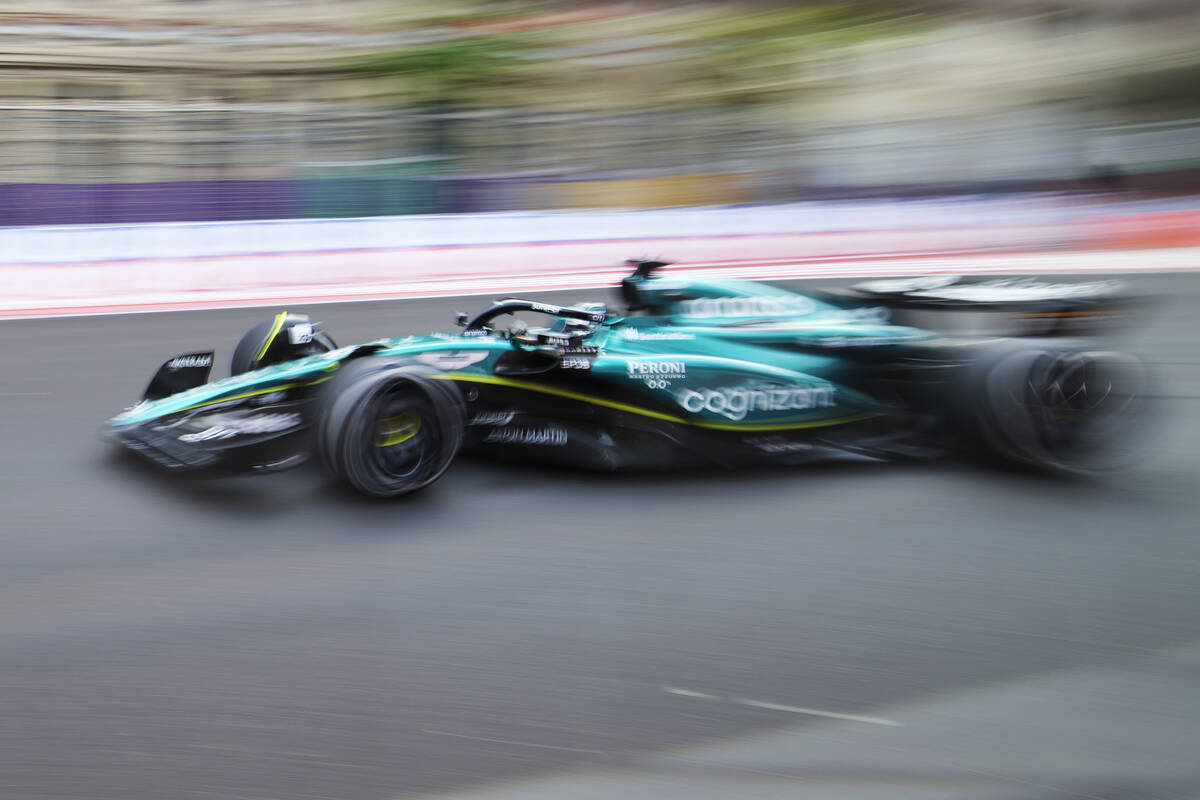Backmarker? Camber? Dirty air?: How to talk Formula One
Formula One racing cars are, like, really fast.
Going to an F1 race is really expensive — really, really expensive, it turns out.
And when F1 comes to Vegas for its first race here in November, it’s going to be such a big event, that it’s forecast to generate twice as much revenue locally as the Super Bowl, even.
And that, right there, is pretty much the beginning, middle and end of all that we know about Formula One.
But relax, fellow F1 neophytes, we still have seven months to bone up on our racing terminology so that we’re not a flat tire amid all the fun.
With this in mind, here’s a starter’s guide to a few F1 terms you need to know, from one racing layman to another.
Backmarker
What it means: A slower, no-hope car that gets lapped during the race, maybe more than once.
In layman’s terms: Sometimes you lay rubber and sometimes you lay an egg. This is an example of the latter.
Ballast
What it means: Weights attached to the car for both balance and to ensure that it meets the minimum weight requirements.
In layman’s terms: They’re like the ankle weights you wear when jogging — you know, if you ever jogged.
Camber
What it means: The angle of the tire in relation to the road. Very important, as it impacts both tire grip and wear.
In layman’s terms: You know how football players choose their cleats depending on the type of field they’re playing on as well as its condition? Camber works kind of like, adjusted for the track and the weather.
Chicane
What it means: A portion of the track featuring at least two sharp turns in tight sequence in opposite directions. A safety feature meant to slow cars down.
In layman’s terms: A curvy part of the track that looks kind of like the letter “s” — if written while hammered on wine coolers.
Dirty air
What it means: The hot air expelled behind a car that can negatively affect the aerodynamics of a car following closely behind.
In layman’s terms: Basically, it’s the opposite of drafting. Also, we are very proud of ourselves for not making the obvious flatulence joke here.
DRS
What it means: Short for Drag Reduction System, this enables drivers to increase speeds by opening a flap on the car’s rear wing.
In layman’s terms: It makes the vroom vroom machines even vroom-ier.
Drive-through penalty
What it means: A penalty where a racer must drive through the pit lane below a specific speed limit after committing an infraction.
In layman’s terms: To borrow a line from “The Big Lebowski”s Walter Sobchak, “Smokey, this is not ’Nam … there are rules.”
Flags
Among the various flags waved at an F1 race:
Black Flag
What it means: You’ve been disqualified.
In layman’s terms: Bad boy!
Blue Flag
What it means: You’re about the get lapped and need to let the faster car pass.
In layman’s terms: Get out of the way, chief.
Green Flag
What it means: Go!
In layman’s terms: Go!
Red Flag
What it means: The race has been stopped, usually due to an accident or bad weather.
In layman’s terms: See: your most recent Tinder date
Yellow flag
What it means: A warning of a hazard on the track.
In layman’s terms: Hit the brakes lest you just might hit something else.
Grand Chelem
What it means: Aka the Grand Slam, this is when a driver manages to earn pole position, record the fastest lap and subsequently lead every lap en route to victory. Only a little over two dozen drivers have ever managed to achieve this feat.
In layman’s terms: The height of winning. This is like earning an Oscar, a Grammy, an Emmy and a Review-Journal “Best of Las Vegas” award all in the same year.
Paddock
What it means: The area behind the pit that houses equipment, racing officials, media members and other behind-the-scenes staff.
In layman’s terms: A locker room with exhaust pipes.
Scrutineering
What it means: A pre-race inspection done to ensure that vehicles are following all current regulations.
In layman’s terms: The racing equivalent of an athlete being tested for performance-enhancing substances. Pee in the cup, Lightning McQueen.
Yaw
What it means: According to Formula1.com: “A term used to describe the movement of an F1 car around an imaginary vertical axis through the centre of the car. Often talked about in conjunction with pitch (movement around an imaginary horizontal axis across the centre of the car) and roll (movement through an imaginary longitudinal axis along the car’s centreline).”
In layman’s terms: Ummm, we don’t know either, man. We’re still learning, too.
Contact Jason Bracelin at jbracelin@reviewjournal.com or 702-383-0476. Follow @jbracelin76 on Instagram



















